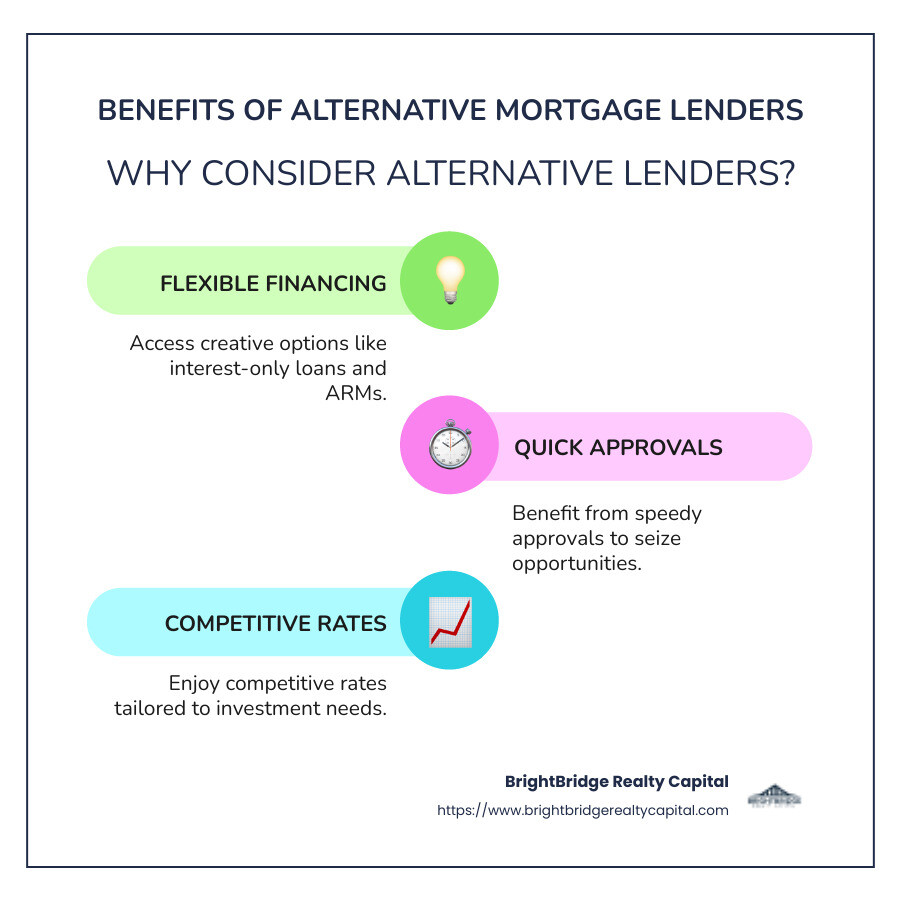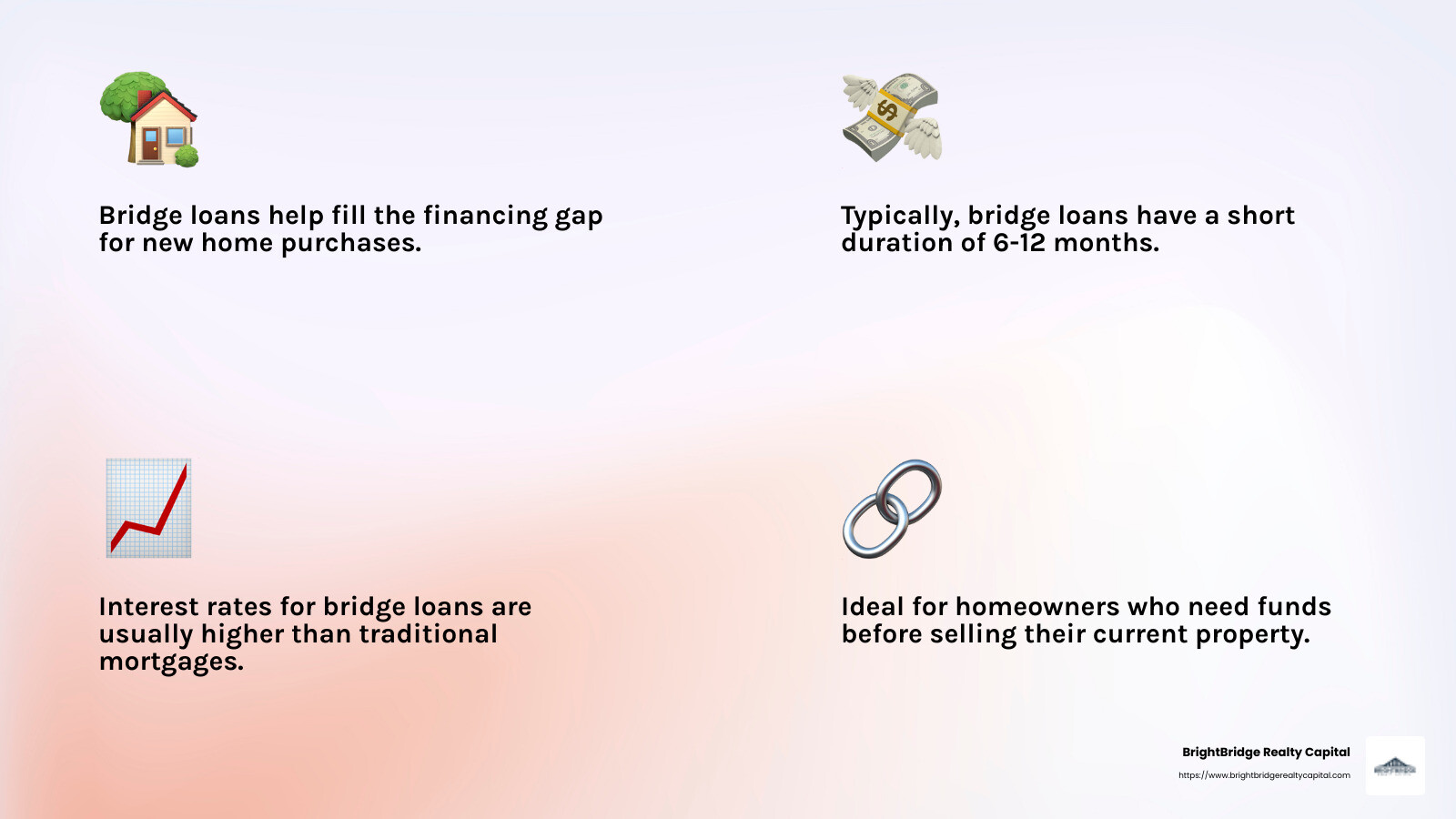Alternative Mortgage Lenders: Breaking the Mold

Alternative mortgage lenders are reshaping the way real estate investors secure financing. Unlike traditional banks, these lenders offer faster and more flexible solutions custom to the unique needs of property investors.
- Non-traditional loans: Get funds for unique properties or circumstances, such as non-warrantable condos and investment properties.
- Flexible financing: Enjoy creative borrowing options like interest-only loans or adjustable-rate mortgages (ARMs).
- Quick and competitive: Benefit from speedy approvals and competitive rates that let you seize investment opportunities right away.
Why consider alternative mortgage lenders?
They break the mold by providing flexible financial products that cater to diverse investment scenarios. Whether you need a bridge loan for a fix-and-flip project, or longer-term financing for a rental portfolio, these lenders have something to offer. However, weigh the benefits against potential drawbacks, such as higher interest rates.

Simple alternative mortgage lenders glossary:
Understanding Alternative Mortgage Lenders
Alternative mortgage lenders are changing the landscape of home financing, offering innovative solutions that go beyond what traditional banks provide. Let's explore how these lenders are making a difference.
Innovative Lenders
These lenders are not your typical financial institutions. They think outside the box to offer non-traditional loans that cater to unique needs. Whether it's providing loans for non-warrantable condos or investment properties, they tailor their products to fit various financial situations. This flexibility is crucial for borrowers who might not fit the conventional mold.
Credit Unions
Credit unions are member-owned entities that often offer more personalized service. They can be a great source for alternative mortgage products. Their community-focused approach allows them to provide competitive rates and terms that might be better suited for certain borrowers.
Online Platforms
The digital revolution has brought online platforms into the mortgage scene. These platforms streamline the loan application process, making it faster and more efficient. Borrowers can compare different loan products, submit applications, and even get approvals without ever leaving their homes. This convenience is a significant advantage for those looking to secure financing quickly.

The Appeal of Alternative Mortgage Lenders
Alternative lenders offer flexible criteria that can be a lifesaver for those with less-than-perfect credit histories. They focus on the borrower's potential rather than just their past, providing opportunities for those who might otherwise be overlooked by traditional banks.
However, as with any financial product, consider both the pros and cons. While these lenders offer quick and flexible solutions, they often come with higher interest rates and fees. Understanding these trade-offs is key to making an informed decision.
By breaking the mold, alternative mortgage lenders provide options that can be more aligned with the diverse needs of modern borrowers. They offer a fresh perspective in home financing, making them a valuable option for those seeking non-traditional loans.
Types of Alternative Mortgage Products
Alternative mortgage lenders offer a range of non-traditional loans designed to meet diverse financing needs. These products often cater to borrowers who might not qualify for conventional mortgages due to various reasons like unconventional income sources or unique property types.
Non-Traditional Loans
Non-traditional loans include products like interest-only loans, balloon loans, and hybrid ARMs. These loans often feature flexible repayment terms, allowing borrowers to defer principal payments or opt for interest-only payments initially. This can be beneficial for those expecting a significant income increase or who plan to refinance before the loan terms change.
Unconventional Loans
Unconventional loans are custom for properties or situations that traditional lenders might shy away from. This includes financing for non-warrantable condos, properties with large acreage, or homes requiring significant renovation. These loans might have higher interest rates due to perceived risks but offer the flexibility needed for unique buying situations.
Bridge Loans
Bridge loans provide short-term financing solutions for borrowers looking to "bridge" the gap between buying a new property and selling an existing one. They are ideal for those who need immediate funds to secure a new home while their current home is on the market. Bridge loans typically have a short duration, often ranging from a few months to a year, and come with higher interest rates due to their temporary nature.

Flexibility vs. Cost
While alternative mortgage products offer flexibility and cater to unique borrower needs, they often come with higher costs. It's crucial for borrowers to weigh these costs against the benefits of quick access to funds and the ability to finance unconventional properties.
By understanding the variety of alternative mortgage products available, borrowers can find the right fit for their specific financial situation and property needs. This flexibility is what sets alternative mortgage lenders apart, providing options that traditional banks may not offer.
Benefits and Drawbacks of Alternative Mortgage Lenders
When considering alternative mortgage lenders, it's important to understand both the benefits and drawbacks. These lenders can be a lifeline for many, but they come with their own set of challenges.
Flexible Criteria
One of the biggest advantages of alternative mortgage lenders is their flexible criteria. Traditional banks often have strict requirements, like high credit scores and stable employment histories. But alternative lenders can be more lenient, making them ideal for:
- Freelancers or business owners with irregular income patterns.
- Borrowers with low credit scores or limited credit history.
- People interested in unique properties or locations that banks might avoid.
This flexibility allows more people to access home financing, even if they don't fit the traditional mold.
Higher Costs
However, this flexibility comes at a cost. Alternative lenders often charge higher interest rates and require larger down payments, sometimes at least 20%. This is because they take on more risk by lending to individuals who may not meet traditional criteria.
Borrowers should also be aware of potential hidden fees. It's crucial to ask questions like:
- What are the fees at closing, during the loan, and at renewal?
- What happens if you miss a payment?
Understanding these costs is essential to avoid surprises down the line.
Quick Closings
On the plus side, alternative lenders often offer quick closings. If you're in a hurry to close a deal—perhaps because your bank financing fell through—an alternative lender might be able to process your application much faster. This can be a significant advantage in competitive real estate markets, where timing is everything.
In summary, while alternative mortgage lenders offer the benefit of flexibility and speed, they also come with higher costs. It's important for borrowers to weigh these factors carefully before deciding.
How to Choose the Right Alternative Mortgage Lender
Selecting the right alternative mortgage lender can make a big difference in your home financing experience. Here are some key factors to consider:
Eligibility Requirements
Each lender has different criteria for approving loans. Unlike traditional banks, alternative mortgage lenders may focus less on credit scores and more on other factors like income patterns or property types. Before applying, ask these questions:
- What is the minimum credit score required?
- Are there specific income documentation requirements?
- Is there a minimum down payment?
Understanding these requirements upfront can save you time and help you target lenders that match your profile.
Loan Terms
Loan terms can vary widely among alternative mortgage lenders. It's crucial to understand the specifics of your loan agreement. Consider the following:
- Length of the loan term: Shorter terms might mean higher monthly payments but less interest over time.
- Prepayment options: Can you pay off the loan early without penalties?
- Renewal conditions: Will the lender offer a renewal if your circumstances change, like an improved credit score?
Knowing these details can help you plan your finances better and avoid surprises later.
Interest Rates
Interest rates are a critical factor in determining the overall cost of your mortgage. Alternative mortgage lenders often have higher rates due to the increased risk they take on. Be sure to:
- Compare rates from multiple lenders to find the best deal.
- Ask about rate changes: Are the rates fixed or adjustable?
- Inquire about additional fees: Are there origination fees or other charges that could impact the effective interest rate?
By carefully evaluating interest rates and associated costs, you can ensure you're getting a fair deal that aligns with your financial goals.
Choosing the right lender involves understanding these factors and how they align with your needs. Doing your homework can lead to a smoother, more affordable home financing experience.
Frequently Asked Questions about Alternative Mortgage Lenders
What are alternative mortgage lenders?
Alternative mortgage lenders are financial entities that offer home loans outside the traditional banking system. They aren't regulated as strictly as banks, which allows them to offer more flexible lending criteria. This flexibility makes them ideal for borrowers with unique financial situations, such as freelancers with irregular income or those interested in properties banks might shy away from, like homes in rural areas or fixer-uppers.
How do alternative mortgage lenders differ from traditional banks?
The main distinction between alternative mortgage lenders and traditional banks is the flexibility in their lending criteria. Traditional banks are bound by stringent federal regulations, including mandatory mortgage stress tests and strict credit score requirements.
In contrast, alternative lenders have more leeway. They can craft their own criteria, which often means they can approve loans for people with lower credit scores or unconventional income sources. This flexibility can be a lifesaver for those who struggle to meet the rigid standards of big banks.
Are there risks associated with alternative mortgage lenders?
While the flexibility of alternative mortgage lenders is appealing, it comes with potential downsides. The most notable is the higher cost. Because these lenders take on more risk, they often charge higher interest rates compared to traditional banks. Additionally, borrowers might face substantial fees and penalties, especially if they miss payments or need to refinance.
It's crucial for borrowers to be fully aware of all costs involved. Ask questions like:
- What are the interest rates and fees associated with the loan?
- What penalties exist for missed payments?
- Are there any fees due before closing?
Understanding these risks and costs can help borrowers make informed decisions and avoid unexpected financial burdens.
Conclusion
In the changing landscape of real estate financing, alternative mortgage lenders like BrightBridge Realty Capital are breaking the mold by offering customized and flexible solutions. Our approach focuses on understanding the unique needs of each borrower, ensuring that we provide custom financing options that traditional banks might overlook.
One of the standout features of BrightBridge Realty Capital is our commitment to quick closings. We understand that in real estate, timing is everything. That's why we pride ourselves on our ability to close deals often within a week, allowing investors to seize opportunities without delay. This speed is made possible by our direct lending model, which eliminates intermediaries and streamlines the process.
While traditional banks may offer lower interest rates, the flexibility and speed provided by alternative mortgage lenders can be invaluable for those who don't fit the conventional mold. Whether you're a freelancer, an investor looking to flip properties, or someone with a unique financial situation, BrightBridge Realty Capital is here to help you find the right solution.
Our mission is to support your investment journey with competitive rates and a seamless process. Explore our customized financing options today and see how we can help you achieve your real estate goals.


